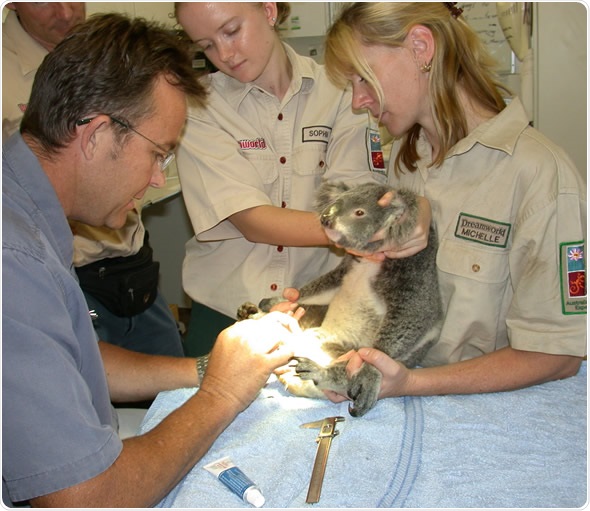Market leaders in temperature controlled microscopy, Linkam Scientific Instruments report on the use of their temperature controlled stages in the study of the effects of cryopreservation of Koala spermatozoa in Australia.

A koala in the cryopreservation program in Queensland, Australia
Since its inception, the technique of Artificial Insemination (AI) has been a controversial yet vital in vivo fertilization method which is regularly used as a fertility treatment for humans, as well as for animal breeding and conservation. The technique, which has been around since the early part of the twentieth century, really became mainstream after the birth of the first ‘test tube baby’ in 1978.
Since the 1980s, AI has become a multi-billion pound global industry. However, despite all of the money being spent within the field, the success rates are still much lower than desired. There are many variables that can lead to unsuccessful treatments. One that has been highlighted is how incorrect cryopreservation can lead to adverse effects on the motility of spermatozoa samples.
Teams from the Dreamworld Zoo and the University of Queensland in Australia, along with experts from the Zoological Society of London have been looking at the mitochondrial functionality of the cells throughout the freeze/thaw process. Mitochondria play a key role in the energy supply of cells. Any mitochondrial damage can reduce this energy supply available within the cell, which in turn affects a range of ATP-driven processes including motility, signal transduction and ion transport. Even the slightest drop in ATP generation can have a huge effect on the fertility of the patient.
One key aspect of this particular study used fluorescent labelling to differentiate Koala spermatozoa cells between those with either low or high levels of mitochondrial membrane potential (MMP). Cryomicroscopy was used to identify the critical temperatures at which the cells became damaged.
The cells were subjected to cooling and heating cycles using the Linkam BCS196 cryo-stage to replicate the exact freeze/thaw processes seen in AI cryopreservation techniques. During the cooling and subsequent rewarming, simple subjective observations of sperm motility were also taken.
The study found that the cryopreservation of spermatozoa samples significantly and irreversibly reduced the proportion of cells with a high level of MMP which of course has negative knock on effects for fertility. The study also looked at how cryopreservation affects the plasma membrane of the cell, and whether or not cryoprotectants such as Glycerol may improve the viability of spermatozoa.
Dr Steven Johnson, who was a key member of this study, was highly impressed with the Linkam stage's ability to allow the samples to be analysed at cryo temperatures; “The Linkam cryo-stage in combination with fluorescent probes was most useful for determining in real-time the most sensitive stages of cryoinjury in koala spermatozoa.”
With some of the current AI techniques being classed as outdated, and the necessity of fertility treatments ever rising, it is vitally important that studies like these exist. It is the findings of such studies which help the better understanding of how to store samples in order for them to be kept at optimum quality and performance.
Visit Linkam at www.linkam.co.uk. and learn about the broad range of applications in the field of temperature-controlled microscopy.
About Linkam Scientific Instruments
Linkam develops and manufactures a broad range of temperature controlled stages from high to cryo temperatures for both OEM and end users. These are used in conjunction with light microscopes and a wide range of analytical techniques including Raman, FTIR, WAX/SAX and other X-ray techniques to visualise and characterise the properties of materials. Linkam stages are found in thousands of laboratories worldwide with the most successful microscope heating stage, the THMS600, selling over 5,000 units alone. Linkam is the market leader in temperature controlled microscopy.